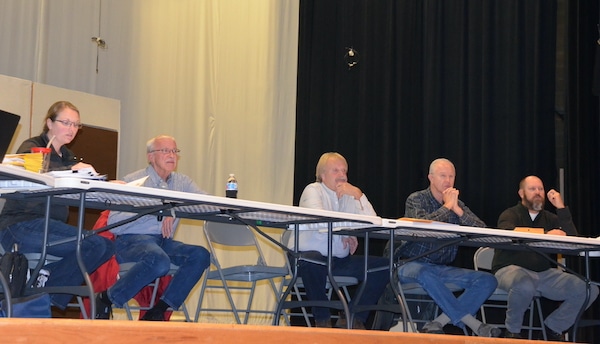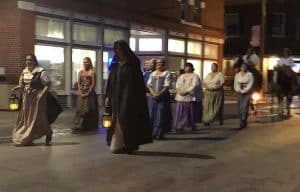Cornerstone Laine goes to council

The Cornerstone Laine saga is now in the hands of the Waterloo City Council after the Waterloo Zoning Board of Appeals on Thursday night voted 3-2 against a special use permit request for the proposed women-only recovery residence at 228 Mueller Lane.
Permit approval faced an uphill battle, as the zoning board previously voted against Cornerstone Laine in the summer and with only five board members present Thursday night, four affirmative votes were required for it to pass.
Zoning board members voting against the special use permit were Ken Gibbs, Larry Goessling and William Boothman. Gibbs presided over the meeting in place of chairman Ken Hartman, who was absent due to a recent medical procedure. Those voting for approval were Lauren Poettker and Leonard Loerch.
The initial zoning board vote was 4-3 against in July, with Boothman joining Poettker and Loerch in approval then.
“The zoning board chose to follow our interpretation of Waterloo city code,” Gibbs told the Republic-Times on Friday.
The Waterloo Planning Commission voted to recommend special use permit approval for Cornerstone Laine earlier this month, with conditions that included a six-foot privacy fence, building inspections, security measures and visitation limits.
The Waterloo City Council will receive a record of Thursday’s meeting plus a written report from the zoning board and will either affirm or reverse its decision during the next council meeting set for 7:30 p.m. Nov. 1 in the Waterloo High School auditorium.
After the zoning board voted down Cornerstone Laine’s first special use permit request in July, Waterloo Alderman Steve Notheisen said he believed the action was “discriminatory” and could open the city up to a lawsuit. In August, the city council amended its code of ordinances to give aldermen the final say.
Cornerstone Laine, proposed by local residents Leisa and Adrian Martinez at the former site of the senior independent living facility known as Rosedale House, would be a 24-resident center dedicated to helping women experiencing drug and alcohol addiction through a voluntary 90-day program that includes meals, peer support, 12-step programs and a Bible study at a cost of $8,000. Two scholarships would be available every 90 days, and residents can use various payment options if needed.
The Martinezes were represented at Thursday’s meeting by attorney Abby Southerland of the American Center for Law and Justice.
“We are disappointed with the ZBA’s vote not to approve the petition for a recovery residence,” Southerland told the Republic-Times on Friday. “The decision, in the eyes of the law, is devoid of rational basis. Waterloo and its residents would be incredibly blessed to have this life-saving and life-giving ministry in their community. We still have hope that the city council will do the right thing. The ACLJ stands ready to take any and all legal action to defend Cornerstone Laine recovery’s rights.”
Southerland submitted a letter that was read into the record Thursday night, stating that there are federal laws in place to protect the Martinezes in their efforts to operate Cornerstone Laine. Her letter stressed that a decision to deny this special use permit constitutes “disparate treatment” in violation of the Federal Housing Act, Americans with Disabilities Act and 14th Amendment, and would be based on “unfounded fears.”
Gibbs told attendees after Southerland’s letter was read that the potential for a lawsuit “is not new news” to the zoning board.
Much of Thursday’s meeting was spent discussing 13 conditions the zoning board imposed as part of the special use permit request. Southerland, on behalf of the Martinezes, pushed back on a few of them. One of the main topics of debate was the requirement of a privacy fence.
Southerland told the zoning board it’s an “unfair consideration” that a fence be required. Gibbs countered that a fence is an “essential requirement to operate” a facility such as this, serving as privacy for Cornerstone Laine residents and both “security and obscurity” for the neighboring homes. The planning commission also required a privacy fence as part of its conditions during recommendation for approval.
On Friday, Gibbs told the paper that it is not unusual to include conditions as part of a special use permit.
“The conditions are meant to protect the city and protect the residents,” Gibbs said.
A total of four people spoke in favor of Cornerstone Laine, with three speaking against plus two letters in opposition read at the meeting. Among those in opposition was Waterloo Alderman Jim Hopkins, who serves the ward in which Cornerstone Laine is proposed. Hopkins – who voted against both the amendment to city code allowing recovery residences to operate as B2 zoning with a special use permit and the change in special use permit protocol giving aldermen the final say – stressed Thursday night that “zoning is also set up to protect the neighbors.”
The other alderman residing in Cornerstone Laine’s ward is Jim Trantham, who also voted against the recovery residence zoning amendment language earlier this year. That city council vote was 5-3 in favor, with Alderman Clyde Heller also voting against.
As for this matter now going to the city council, Gibbs said it’s an appropriate step.
“I think our elected officials need to be the ones with the final say,” he said.
For prior articles on Cornerstone Laine, click here.






